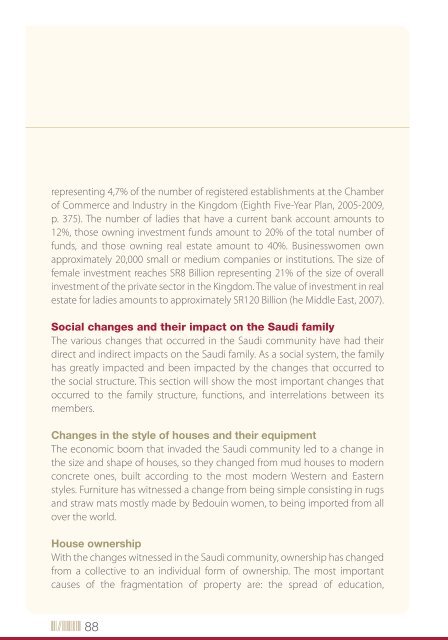General Supervisor
General Supervisor
General Supervisor
Create successful ePaper yourself
Turn your PDF publications into a flip-book with our unique Google optimized e-Paper software.
epresenting 4,7% of the number of registered establishments at the Chamber<br />
of Commerce and Industry in the Kingdom (Eighth Five-Year Plan, 2005-2009,<br />
p. 375). The number of ladies that have a current bank account amounts to<br />
12%, those owning investment funds amount to 20% of the total number of<br />
funds, and those owning real estate amount to 40%. Businesswomen own<br />
approximately 20,000 small or medium companies or institutions. The size of<br />
female investment reaches SR8 Billion representing 21% of the size of overall<br />
investment of the private sector in the Kingdom. The value of investment in real<br />
estate for ladies amounts to approximately SR120 Billion (he Middle East, 2007).<br />
Social changes and their impact on the Saudi family<br />
The various changes that occurred in the Saudi community have had their<br />
direct and indirect impacts on the Saudi family. As a social system, the family<br />
has greatly impacted and been impacted by the changes that occurred to<br />
the social structure. This section will show the most important changes that<br />
occurred to the family structure, functions, and interrelations between its<br />
members.<br />
Changes in the style of houses and their equipment<br />
The economic boom that invaded the Saudi community led to a change in<br />
the size and shape of houses, so they changed from mud houses to modern<br />
concrete ones, built according to the most modern Western and Eastern<br />
styles. Furniture has witnessed a change from being simple consisting in rugs<br />
and straw mats mostly made by Bedouin women, to being imported from all<br />
over the world.<br />
House ownership<br />
With the changes witnessed in the Saudi community, ownership has changed<br />
from a collective to an individual form of ownership. The most important<br />
causes of the fragmentation of property are: the spread of education,<br />
88<br />
emergence of individual jobs for children, emigration of many citizens from<br />
pastoral and rural areas to urban areas, as well as the shift from an extended<br />
to a nuclear family. All these factors have encouraged the fragmentation of<br />
property and the emergence of individual property. Several families divided<br />
inheritance among their children, which resulted in many “big,” deeply-rooted<br />
families in the past losing their economic positions in the contemporary Saudi<br />
community. Wealth has come to be in the hands of a group of individuals that<br />
own wealth and power.<br />
Emergence of domestic servants<br />
The financial boom that occurred in the Saudi community has helped the<br />
emergence of domestic servants (house maids). In the traditional Saudi<br />
community, the phenomenon of domestic service was not common. After the<br />
discovery of oil, owing to the size of the houses and the fact that women work<br />
as educators, it was possible for many families with financial means to bring in<br />
house maids from some Arab countries such as Egypt, Morocco, and Ethiopia<br />
or from some East Asian countries such as India, Indonesia, Philippines, Sri<br />
Lanka, Bangladesh, and others. Having maids is not restricted to the rich only,<br />
but extends to the various social layers: in the countryside, in rural areas, and<br />
in cities.<br />
Change in the family’s form<br />
The changes that occurred to the Saudi community led to a change in the form<br />
of the family. The most common type of family in the past was the extended<br />
one. The most common type now is the nuclear family made up of father and<br />
mother and unmarried children.<br />
Rate of fertility in the family<br />
The rate of fertility is still very high in the Kingdom if compared to other countries.<br />
The population of the Kingdom went from 7 million inhabitants in 1974 to 27,136<br />
89


